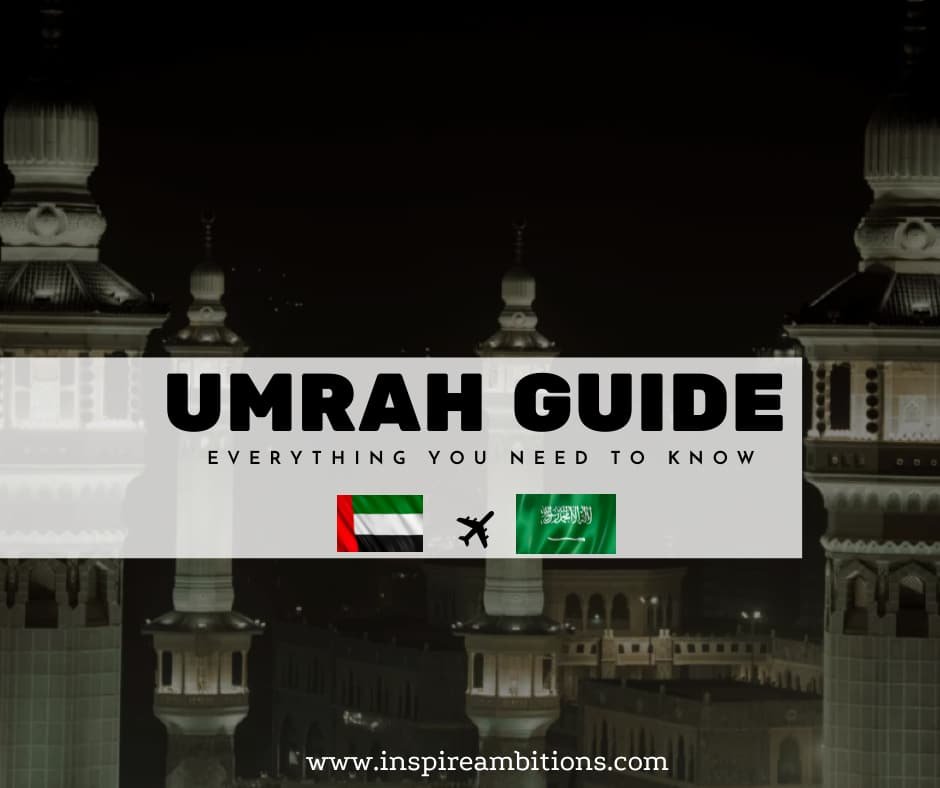Visa Omra pour les résidents des Émirats arabes unis – Un guide complet des exigences et du processus
The Umrah is a pilgrimage to Mecca, Saudi Arabia, that can be undertaken at any time of the year, in contrast to the Hajj, which has specific dates according to the Islamic lunar calendar.
UAE residents interested in performing Umrah must obtain a visa to enter the Kingdom of Saudi Arabia. The process has been streamlined over the years, accommodating the growing number of pilgrims from the UAE.

With a diverse expatriate population, the UAE has specific eligibility criteria that residents must meet to apply for an Umrah visa. Understanding the types of Umrah visas available and the associated costs is vital for prospective pilgrims.
Alongside, they must navigate the application process, which involves gathering required documents, meeting financial criteria, and making travel and accommodation arrangements. Ensuring compliance with health and safety regulations is also crucial for safe travel and fulfilling the pilgrimage obligations.
Points clés à retenir
- Umrah visas enable UAE residents to make the pilgrimage to Mecca outside of the Hajj period.
- Applicants must fulfill eligibility criteria and navigate a specific application process for an Umrah visa.
- Awareness of travel, accommodation, health, and financial requirements is essential for ensuring a seamless Umrah experience.
Eligibility Requirements for UAE Residents

When planning to perform Umrah, UAE residents must adhere to specific eligibility criteria for their passport and residency status. Understanding these requirements is crucial for a hassle-free visa application process.
Passport and Nationality
UAE residents must possess a passeport valide to apply for an Umrah visa. This passport should have a minimum validity of six months from entry into Saudi Arabia. Moreover, it is pertinent that the passport has at least two blank pages for entry and exit stamps. The applicant’s nationality plays a significant role in the application process, and they must prove their legal residency in the UAE, irrespective of their original nationality.
Residency Validity and GCC Countries
Residents of the UAE must ensure their UAE residency visa is valid for at least three months beyond their intended stay in Saudi Arabia. Applicants from the Gulf Cooperation Council (GCC) countries are eligible for streamlined application procedures if they reside in the UAE with a GCC residency permit. The GCC countries include Bahrain, Kuwait, Oman, Qatar, Saudi Arabia, and the United Arab Emirates. However, non-GCC expatriates holding UAE residency permits must undergo the standard Umrah visa application process.
Types of Umrah Visas

For UAE residents seeking to perform Umrah, understanding the variety of visas available is essential. Each visa type caters to specific needs and has particular requirements.
Visa Omra
Un Visa Omra is specifically for those intending to perform the Umrah pilgrimage outside of the Hajj season. It’s a type of Saudi Visa that allows pilgrims to enter Saudi Arabia and travel to the holy cities of Mecca and Medina. This visa is typically valid for 30 days but does not allow holders to engage in any form of employment or business during their stay.
E-Visa
E-Visa, also known as an electronic visa, has modernised the application process for an Umrah visa. Applicants can apply online without the need to submit their passports to a consulate. The E-Visa is linked directly to the passport and is available soon after approval. It simplifies entry into Saudi Arabia, as it can be obtained for both tourism and Umrah purposes, converging into what is known as the Saudi Tourist Visa.
Visa à l'arrivée
Visitors from certain countries may obtain a Visa à l'arrivée when travelling to Saudi Arabia for Umrah. This type of visa can be acquired directly upon entry, eliminating the need for pre-travel applications. It is important to verify eligibility before travel, as only visitors from eligible countries can avail themselves of this option. This convenience allows for a more spontaneous pilgrimage or visit. Still, travellers should note that normal visa conditions apply regarding the length of stay and restrictions on work and business activities.
Application Process for Umrah Visa
The application process for an Umrah visa for UAE residents is streamlined through an online system, which includes the requirement of essential documents and ends with issuing a visa number.
Online Portal and Nusuk App
Applicants must initiate their Umrah visa application through the Ministry of Hajj and Umrah’s online portal. Alternatively, they can use the Nusuk app, an integrated digital platform to manage the entire Umrah experience, including visa application. Both platforms provide comprehensive guidance throughout the application stages.
- Create an account.
- Complete the application form.
Documents and Requirements
The following are the documents and requirements for an Umrah visa:
- Valid Passport: A passport with a minimum of six months validity from the date of application.
- Residency Permit: A valid UAE residency permit.
- Biometric Data: Applicable for residents aged between 18 and 50 years old.
- Photograph: A recent passport-sized photo with a white background.
All documents should be uploaded to the online portal or Nusuk app per the specified format.
Visa Approval and Number
Once the application is submitted along with all necessary documents, the Ministry of Hajj and Umrah will review it. Approval is then communicated through the online portal or the Nusuk app, followed by assigning a unique visa number, which applicants can use to track their application and final visa status. This visa number is crucial for subsequent stages of the pilgrimage preparation.
Cost and Financial Aspects
The financial considerations for UAE residents obtaining an Umrah visa primarily involve the visa fees and additional costs that could be incurred. Accurate budgeting for these expenses is essential for a hassle-free pilgrimage.
Visa Fees
Le Frais de visa for an Umrah visa for UAE residents can vary, typically based on the season and the service provider. As of the knowledge cutoff date, the visa fee is structured as follows:
- Standard Umrah Visa: AED 300
- Service Charge: AED 100
These fees include 5% VAT, consistent with the UAE’s tax regulations.
Additional Costs
Additional expenses beyond the visa fees are to be anticipated. They may include, but are not limited to:
- Transport: Flights and ground transport
- Hébergement: Hotel bookings
- Assurance voyage: It can differ depending on the provider and level of coverage.
Travel agencies often offer packages that consolidate these costs but can also be managed individually. Prices for flights and hotels fluctuate based on the season, with Ramadan typically being the most costly due to high demand.
Voyage et hébergement
When planning for Umrah, UAE residents have various options for their travel and stay arrangements. It is essential to consider the choice of airline for the journey to Saudi Arabia and securing accommodation that meets budgetary and comfort needs.
Flights and Airlines
Travellers can access multiple airlines offering direct and connected flights to Saudi Arabia. Arabie Saoudite et Flynas are popular choices for their frequent services and competitive pricing. Direct flights from major UAE cities to Jeddah and Medina are readily available. A strategic approach to booking may uncover opportunities for cheap flights, mainly when reserving in advance or during airline promo periods.
- Arabie Saoudite: Operates multiple flights daily, with options from Dubai, Abu Dhabi, and Sharjah.
- Flynas: Offers budget-friendly fares with a focus on cost efficiency and convenience.
| Airline | Fréquence | Remarques |
| Arabie Saoudite | Multiple daily flights | Renowned for full-service |
| Flynas | Regular flights | Known for being budget-conscious |
Hotel and Accommodation
Upon arrival, pilgrims must have their stay at either a hotel or other forms of accommodation reserved before their travel. Accommodation options range from luxury hotels to more affordable, modest establishments. The proximity to the Holy sites in Makkah and Medina significantly influences hotel choices.
- Hôtels de luxe: Luxury hotels provide premium services and are generally closer to the Masjid al-Haram in Makkah and the Prophet’s Mosque in Medina.
- Budget Accommodation: Available at a lower cost, these options may be situated farther from the central areas but are often served by shuttle services to the Holy sites.
| Accommodation Type | Distance from Holy Sites | Expected Amenities |
| Hôtels de luxe | Within 1-2 km | On-site dining, room service, shuttle services |
| Budget Accommodation | May exceed 2 km | Basic amenities may include shuttle services |
Règlements en matière de santé et de sécurité
As UAE residents prepare for Umrah, they must adhere to the specific health and safety regulations set by Saudi Arabian authorities. These regulations ensure the well-being of the pilgrims and include mandates on COVID-19 measures, as well as health and medical insurance coverage requirements.
COVID-19 Measures
Saudi Arabia has instituted COVID-19 preventive measures for all incoming travellers, including those arriving for Umrah. Vaccination is a cornerstone of these protocols. Umrah pilgrims must prove they are fully vaccinated against COVID-19 with vaccines approved by Saudi Arabian health authorities. Vaccination evidence must be presented before visa issuance and arrival in the kingdom. In addition, social distancing practices are to be strictly followed at all times during the pilgrimage.
- Mandatory vaccination requirements: Full vaccination with an approved vaccine.
- Social distancing: Measures to be obeyed in Haram and during rituals.
Health Insurance and Medical Insurance
All Umrah visitors from the UAE must procure assurance santé that covers COVID-19 risks and associated medical expenses. The insurance policy must be valid for their stay in Saudi Arabia, ensuring that any medical emergencies, including those related to COVID-19, are taken care of without undue financial burden on the pilgrim.
- Health Insurance requirements: Valid and comprehensive coverage.
- Medical Insurance benefits: To cover all COVID-19-related medical expenses.
Umrah Pilgrimage Details
The Umrah pilgrimage is an Islamic ritual Muslims, including UAE residents, perform. It consists of specific religious practices within the defined Umrah season, mainly in the cities of Mecca and Medina.
Umrah Rituals and Season
Umrah can be undertaken at any time of the year, unlike Hajj, which has specific dates according to the Islamic lunar calendar. The peak season for Umrah typically falls between Safar and Ramadhan, with a notable increase in pilgrims during the latter due to the month’s sacred status.
The essential rituals of Umrah involve:
- Ihrâm : A sacred state a pilgrim must enter before crossing the designated Miqat (pilgrimage boundary). It is marked by wearing two white unsown clothes for men, with women wearing loose clothing covering all but the face and hands.
- Tawâf : The circumambulation of the Kaaba in the Grand Mosque was performed seven times counterclockwise.
- Sa’iy: Walking back and forth seven times between the hills of Safa and Marwah.
- Halq ou Taqsir : The act of shaving or cutting the hair, respectively, signifying the end of the Umrah.
These rituals are revered, symbolising unity and submission to Allah. The Ministry of Foreign Affairs of Saudi Arabia facilitates the Umrah visa process and provides detailed guidelines for pilgrims.
Holy Sites and Grand Mosque
Mecca is central to the Umrah pilgrimage, hosting the Grand Mosque, which houses the Kaaba, the focal point of Islamic worship. Pilgrims also visit other significant sites such as:
- Al-Masjid an-Nabawi: Located in Medina, it is the Prophet’s Mosque and the second holiest site in Islam. The mosque contains Al Rawda al Sharifa, which encompasses the tomb of Prophet Muhammad.
- Jannat al-Baqi: Adjacent to Al-Masjid an-Nabawi, this is a significant Islamic cemetery where many relatives and companions of Prophet Muhammad are buried.
The respective authorities meticulously maintain these sites to accommodate the large influx of pilgrims, ensuring their ability to perform Umrah with devotion and tranquillity.
Considérations supplémentaires relatives au voyage
UAE residents must consider specific regulations and sensitivities when planning for Umrah visas. These include mahram requirements for women, the intricacies of permits and group packages, and an understanding of cultural and religious practices.
Women and Mahram Regulations
Under Saudi law, women under 45 must travel with a mahram for Hajj or Umrah. A mahram is typically a male relative such as a father, brother, husband, or son over 18. However, for women over 45, travel is permitted with an organised group, and no mahram is needed, provided they submit a no-objection certificate from their mahram.
Permits and Group Packages
Permits are essential for Umrah travel and must be arranged in advance. Tour operators provide various Umrah package deals, often including permits as part of their services. Group packages can be beneficial as they collectively arrange permits, accommodation, and transportation, often resulting in a cost-effective and streamlined experience.
- Permits: Must be obtained before travel.
- Group Packages: These are usually arranged by tour or Umrah operators and can include visas, flights, accommodation, and transportation.
Cultural and Religious Sensitivities
Visitors should be aware of cultural and religious practices in Saudi Arabia. Dress modestly, perform rituals correctly, and respect local customs and traditions. Pilgrims are advised to educate themselves on the appropriate conduct before embarking on their journey. Tour operators often guide this as part of the Umrah package.
- Dress: Modest and as per Islamic tradition.
- Behaviour: Respectful of customs and religious practices.







